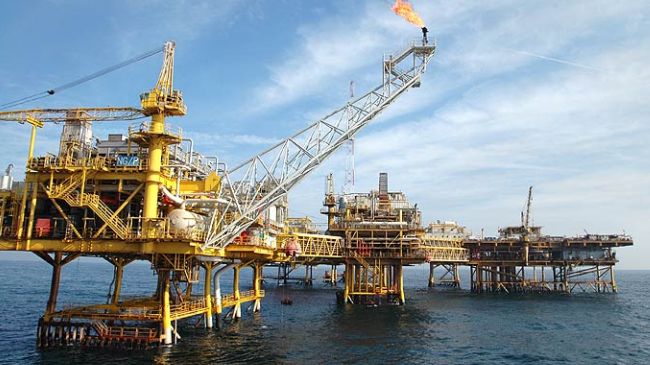 The file photo shows an offshore oil field in southern Iran.[/caption]
The file photo shows an offshore oil field in southern Iran.[/caption]TEHRAN, Dec. 2 (UPI) --�The Iranian government said Tuesday it was drafting its annual budget for the next calendar year on the assumption that oil prices will be $70 per barrel.
The Organization of Petroleum Exporting Countries, of which Iran is a member, said the price for the 12 blends that make up its benchmark fetched $85.06 per barrel in October, with the Iranian Heavy grade trading at $84.61.
For Monday, the�OPEC basket price�was $66.44, mirroring the international bear market for crude oil.
Yahya al-e Es-Haq, the head of the Tehran Chamber of Commerce, said officials were drafting a budget for the fiscal year that begins in March based on $70 per barrel. There are�few concerns�about the current slump in prices, he said.
"The oil sold [now] will show its impacts on the budget three months later," he said. "Therefore, the government is not worried over the impact of oil price fall on the [current year] budget. "
The World Bank said in an October report�the Iranian economy is contracting, but at a slower pace than before. Sanctions imposed on the Iranian energy sector in response to its nuclear program resulted in a real gross domestic product contraction of 5.8 percent last year.
In November, parties to multilateral nuclear negotiations agreed to extend talks through the middle of 2015. Iran under recent negotiation agreements can export around 1 million barrels of oil per day in exchange for a commitment to curb parts of its nuclear research efforts.
For oil products, Iran earned $5.6 billion more than it had year-on-year, but that money is isolated from Iran because of U.S. sanctions.
Iranian officials from the negotiating table in Vienna last month said some of the frozen funds may be released on a monthly basis as part of�an extended relief package.
The World Bank said there were signs of recovery emerging for the Iranian economy in part because of the relief from sanctions. Non-oil exports were improving and inflationary pressures on the economy have fallen from a July 2013 peak of 45 percent to 13 percent in June.
Last week, Iranian Minister of Economic Affairs and Finance Ali Tayyebnia said his country is "among the safest countries for (foreign) investment."
By UPI
The Iran Project is not responsible for the content of quoted articles.










